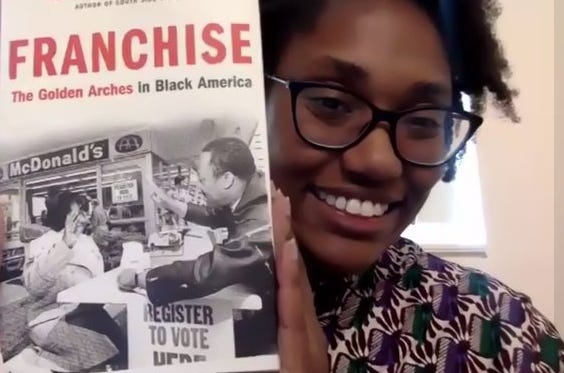This week, we interviewed Dr. Marcia Chatelain, the Pulitzer Prize-winning author who writes Your Favorite Prof, a publication about fast food history.
This interview has been lightly edited for length and clarity.
What’s your Substack about in one sentence?
Your Favorite Prof features writing about my two great loves: fast food history and strategies for being an excellent teacher.
Why do you think fast food history is worth reflecting on now?
As a historian, I’m always searching for research topics that can bring people together on common ground so they can think critically about how the past informs our present.
The fast food industry encapsulates so many critical issues of our time – the politics of labor, the demands and pressures of the food supply, ideas about taste and aesthetics, debates about marketing to children, racial health disparities, and more. Everyone has a notion of what fast food is, but fewer people realized how illustrative and powerful it can be as a text for diving deeply into our culture.
Before researching fast food as an academic pursuit, what was your relationship to it?
I ate a lot of fast food growing up and into my early adulthood. Fast food was an outsize part of my life and supplied a lot of fun for me and my friends. I don’t eat it very often now, but I appreciate what it tells me about the world.
Fast food is commonplace and we don’t often think of it as very special in the United States, but the worlds created by fast food marketers and the technologies necessary to deliver so much food to people is really fascinating. I was a child of the 1980s, so fast food companies were constantly experimenting with foods that fit with the low-fat diet craze, the anti-carb moment, and foods known as “ethnic.” I am obsessed with the ephemera from fast food culture, which is so creative and inventive. I also remember the great commercials featuring celebrities like Michael Jordan.
There's a warmth and accessibility you bring to academia. For example, you share your research on Substack and start each post with "Good Morning Class." Why is this approach important to you?
I love being a professor. My students mean the world to me, and I spend a lot of time consulting and creating workshops to help teachers improve their teaching. I think that being an educator – whether you are teaching first grade or a graduate seminar – can unlock some of your worst insecurities and anxieties. It can be really exposing to stand in front of a class and share your intellectual passions. So, I try to model an accessible, but still academically engaging way of reaching students with my research to show learners just how much fun the process of discovery is.
In researching your book Franchise: The Golden Arches in Black America, you combed through advertising archives and ate at many McDonald’s locations. What’s one insight that surprised you?
In researching McDonald’s relationship to African Americans, I was surprised by the number of civil rights groups and emerging Black leaders who endorsed fast food as a lever of Black empowerment and social mobility. I don’t begrudge people who saw that potential in 1968, when the future felt so uncertain in terms of what would the freedom movement look like moving forward. Yet, fast food franchising had captured the imaginations of people as different as James Brown, The Godfather of Soul, and Julian Bond, the activist and congressman.
I found out about the Pulitzer while looking at Twitter and trying to give my son a bottle.
Franchise was recently awarded a Pulitzer Prize in History – congratulations! How has it felt to see your book resonate so deeply?
The Pulitzer was the second biggest surprise of my life. The first was the arrival of my son, whom I adopted with 24 hours notice earlier this spring. I found out about the Pulitzer while looking at Twitter and trying to give my son a bottle.
Never in a million years would I imagine that my weird book about McDonald’s and civil rights would win such a prestigious honor. Franchise’s recognition is way bigger than me; it’s a nod to all the other people who see the deeper stories in the everyday.
Who's another Substack writer you'd recommend?
I love Heir Mail by Meredith Haggarty, Study. Marry. Kill by Alexis Coe, books/snacks/softcore by Samantha Irby, Crème de la Crème by Aminatou Sow, Essaying by Tressie Cottom, and Best Evidence. All my favorite things: conversations about the 1%, history, Judge Mathis, Black feminism, sociology, and true crime!
Subscribe to Marcia’s newsletter, Your Favorite Prof, or find her on her website, Twitter, or Instagram.




Share this post